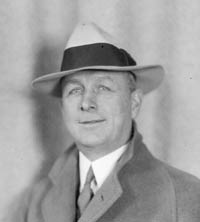Arthur Cheney Train

Arthur Cheney Train (6 September 1875 – 22 December 1945), also called Arthur Chesney Train, was an American lawyer and writer of legal thrillers, particularly known for his novels of courtroom intrigue and the creation of the fictional lawyer Mr. Ephraim Tutt.
Life
Train was born in Boston, Massachusetts. His father was lawyer Charles Russell Train, who served for many years as attorney general of Massachusetts, and his mother was Sara Maria Cheney. Train graduated with a BA from Harvard University in 1896 and LLB from Harvard Law School in 1899.[1]
In 1897, Train married Ethel Kissam. They had four children. Ethel died in 1923 and Train married Helen Coster Gerard, with whom he had one child, John Train.[1]
In January 1901, Train became assistant in the office of the New York County District Attorney. In 1904 he started his literary career with the publication of the short story "The Maximilian Diamond" in Leslie's Monthly. He ran the two careers in parallel until 1908 when he left the District Attorney's office to open a general law practice in the Mutual Life Building at 34 Nassau Street in New York City.[1] His 1907 novel, Mortmain, was one of the earliest works in the alien hand syndrome genre and was adapted into a 1915 film of the same name that is now lost.[2]
From 1915 to 1922, Train was in private practice as a lawyer with Charles Albert Perkins while continuing to write, not just novels but short stories, plays, and journalism. In 1919, he created the popular character of Mr. Ephraim Tutt, a wily old lawyer who supported the common man and always had a trick up his sleeve to right the law's injustices.[1] Train wrote dozens of stories about Tutt in the Saturday Evening Post. The fictional Ephraim Tutt became "the best known lawyer in America," particularly after the appearance of Yankee Lawyer, an immensely popular book that purported to be Tutt's autobiography. Train also coauthored two science fiction novels with eminent physicist Robert W. Wood.[3] After 1922, he devoted himself to writing.[1]
Bibliography
- Train, A. C. (1905). McAllister and his Double. New York: Charles Scribner's Sons.
- Train, A. C. (1907). Mortmain. New York: Charles Scribner's Sons.
- Train, A. C. (2006) [1908]. True Stories of Crime from the District Attorney's Office. Echo Library. ISBN 1406810711.
- Train, A. C. (2005) [1908]. True Stories of Celebrated Crimes from the District Attorney's Office. Kessinger Publishing. ISBN 0766197271.
- Train, A. C. (1911). The Confessions of Artemas Quibble. New York: Charles Scribner's Sons.
- Train, A. C. (1912). Courts, Criminals and the Camorra. New York: Charles Scribner's Sons.
- Train, A. C. (1912). "C Q", or, In the Wireless House. New York: The Century Co.
- Train, A. C.; Wood, R. W. (1915). The Man Who Rocked the Earth. Garden City: Doubleday, Page & Co.
{{cite book}}: Unknown parameter|lastauthoramp=ignored (|name-list-style=suggested) (help) - Train, A. C.; Wood, R. W. (1916). The Moon Maker. Garden City: Doubleday, Page & Co.
{{cite book}}: Unknown parameter|last-author-amp=ignored (|name-list-style=suggested) (help) - Train, A. C. (1914). The "Goldfish", Being the Confessions of a Successful Man. New York: The Century Co.
- Train, A. C. (1918). The Earthquake. New York: Charles Scribner's Sons.
- Train, A. C. (2005) [1919]. Tutt and Mr. Tutt. Alan Rodgers Books. ISBN 1598186647.
- Train, A. C. (1919). By Advice of Counsel. The Curtis Publishing Co.
- Train, A. C. (1923a). His Children's Children. New York: Charles Scribner's Sons.
- Train, A. C. (1923b). Tut, Tut! Mr. Tutt. New York: Charles Scribner's Sons.
- Train, A. C. (1924). The Needle's Eye. New York: Charles Scribner's Sons.
- Train, A. C. (1925). The Blind Goddess. New York: Charles Scribner's Sons.
- Train, A. C. (1926). Page Mr. Tutt. New York: Charles Scribner's Sons.
- Train, A. C. (2005) [1928]. Ambition. Kessinger Publishing. ISBN 1417934050.
- Train, A. C. (1929). Illusion. New York: Charles Scribner's Sons.
- Train, A. C. (1930). The Adventures of Ephraim Tutt, Attorney and Counsellor-at-Law. New York: Charles Scribner's Sons.
- Train, A. C. (1930). Paper Profits: A Novel of Wall Street. New York.
{{cite book}}: CS1 maint: location missing publisher (link) - Train, A. C. (1937). Mr. Tutt's Case Book Being a Collection of His Most Celebrated Trials as Reported and Compiled. New York: Charles Scribner's Sons.
- Train, A. C. (1939). My Day in Court. New York: Charles Scribner's Sons.
- Train, A. C. (1943). Yankee lawyer: The Autobiography of Ephraim Tutt. New York: Charles Scribner's Sons.
- Train, A. C. (1945). Mr. Tutt Finds a Way. New York: Charles Scribner's Sons.
- Train, A. C. (1961). Mr. Tutt at his Best: A Collection of his Most Famous Cases. Kessinger Publishing. ISBN 0891905839.
References
- Schmid, D. (1999) "Train, Arthur", American National Biography, Oxford University Press, 21: 799-800, ISBN 0-19-520635-5
- Train, A. C. (1939) My Day in Court, New York: Charles Scribner's Sons: Arthur Train's autobiography
- Obituary in the New York Times, 23 December 1945
External links
- Works by Arthur Cheney Train at Project Gutenberg
- Works by or about Arthur Cheney Train at Internet Archive
- Works by Arthur Cheney Train at LibriVox (public domain audiobooks)

